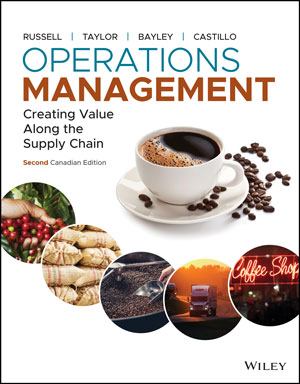
Operations and Supply Chain Management, 2nd Canadian Edition
By Roberta S. Russell, Bernard W. Taylor, Tiffany Bayley, and Ignacio Castillo
The Second Canadian Edition of Operations Management encourages students to understand how to create value and competitive advantage along the supply chain in a rapidly changing global environment. Beyond providing a solid foundation, this course covers increasingly important OM topics including sustainability, corporate social responsibility, global trade policies, securing the supply chain, and risk and resilience. To improve the learning experience for all students, WileyPLUS includes a clear, customizable and mobile-friendly learning path packed with homework practice, feedback, an e-book, Bloomberg videos and much more.
Schedule a Demo Request Instructor AccountWant to learn more about WileyPLUS? Click Here
Real-World Video Activities
WileyPLUS now offers a set of graded analysis activities that pair cutting-edge business video content from Bloomberg with concepts from the Russell text. This new resource provides students with an applied and engaging learning experience to supplement their operations management course.
Data Analytics & Decision-Making Module
With the emergence of Data Analytics transforming the business environment, Wiley has partnered with business leaders in the Business-Higher Education Forum (BHEF) to identify the competencies graduates need to be successful in their careers. As a result, this module includes industry-validated content that prepares operations management students for the changing workforce.
Features Include:
- Operations Management (OM) Skills Videos: These videos connect concepts to the real world by pulling from a variety of industries and walking students through operations with which they are familiar.
- Virtual Tours: Online tours of service and production facilities provide real-world context and include questions that help students apply the concepts they’ve learned.
- Focused on Creating Value Along the Supply Chain: This course shows how the functions and processes described in each chapter fit into a company’s strategic design for the creation of value. About 70 “Along the Supply Chain” Boxes describe how real-world businesses gain a competitive advantage through operations strategies and conclude with critical thinking questions that can be used for assignments and in-class or online discussions.
- Global Operations: Each chapter includes examples that touch on the impact of global operations and how it affects supply chain management.
- Services and Manufacturing: This course strikes a balance between manufacturing and service operations and includes the examination of various service industries in virtually every chapter.
- Balanced Qualitative and Quantitative Approach: This course explains how successful operations managers manage, and how to use quantitative techniques and technology when applicable in a way that’s not overly complex or mathematically intimidating for students.
- Focus on Sustainability: Virtually every chapter includes discussion on the impact of Sustainability on operations and supply chain management and includes examples of how “green practices” impact product service and design, supplier sourcing, manufacturing and delivery.
- Opening Stories Featuring Tim Hortons: This course follows a major Canadian fast food corporation through critical stages of its operations and supply chain management. Most chapter introductions highlight important managerial decisions faced by this company when developing its strategies for quality, production, and distribution. Other chapters continue to focus on unique Canadian-based operations and global supply chains.
- NEW exhibits in every chapter reflecting the latest versions of Excel, OM Tools, and Microsoft Project.
Roberta S. Russell is a Professor of Business Information Technology in the Pamplin College of Business at Virginia Polytechnic Institute and State University. She received a Ph.D and a B.S. from Virginia Polytechnic Institute and State University and an M.B.A. from Old Dominion University. Dr. Russell’s primary research and teaching interests are in the areas of operations and supply chain management, with special emphasis on humanitarian and healthcare operations.
She has been published in Journal of Operations Management, Decision Sciences, IIE Transactions, International Journal of Production Research, IEEE Transactions, Annals of Operations Research, Computers and Operations Research, and others. She is also co-author of the Prentice Hall book, Service Management and Operations. Dr. Russell is a member of DSI, ASQ, POMS, and IIE. She is currently serving as President of the APICS Foundation and as co-chair of the Supply Chain Academic Talent Initiative (SCTAI). Dr. Russell is a Certified Fellow in Production and Inventory Management (CFPIM) and is recognized as a Certified Supply Chain Management Professional (CSCP). She is past vice president of POMS, past president of the Southwest Virginia Chapter of APICS, and has held numerous offices in Southeast DSI.
Her consulting experience with IBM, AT&T, Dupont, Courtaulds, Xaloy, Newport News Shipbuilding, and others brings a practical perspective into the classroom. She has received the Pamplin College of Business Certificate of Teaching Excellence on two occasions, the University Certificate of Teaching Excellence, and the MBA Association’s Outstanding Professor Award. Dr. Russell teaches both undergraduate and graduate students in the classroom and online. She is frequently called upon to give workshops on teaching with technology and has incorporated her experiences into the ancillary material that accompanies this text.
Bernard W. Taylor III is the Pamplin Professor of Management Science and Head of the Department of Business Information Technology in the Pamplin College of Business at Virginia Polytechnic Institute and State University. He received a Ph.D. and an M.B.A. from the University of Georgia and a B.I.E. from the Georgia Institute of Technology. He is the author of the book Introduction to Management Science, 11th Edition and co-author of Management Science, 4th Edition, both published by Prentice Hall. Dr. Taylor has published over 80 articles in such journals as Operations Research, Management Science, Decision Sciences, IIE Transactions, Journal of the Operational Research Society, Computers and Operations Research, Omega, and the International Journal of Production Research, among others. His paper in Decision Sciences (with P. Y. Huang and L. P. Rees) on the Japanese kanban production system received the Stanley T. Hardy Award for its contribution to the field of production and operations management.
He has served as President of the Decision Sciences Institute (DSI) as well as Program Chair, Council Member, Vice President, Treasurer, and as the Editor of Decision Line, the newsletter of DSI. He is a fellow of DSI and a recipient of their Distinguished Service Award. He is a former President, Vice President, and Program Chair of the Southeast Decision Sciences Institute and a recipient of their Distinguished Service Award. He teaches management science and production and operations management courses at both the undergraduate and graduate level. He has received the University Certificate of Teaching Excellence on four occasions, the Pamplin College of Business Certificate of Teaching Excellence Award, and the Pamplin College of Business Ph.D. Teaching Excellence Award at Virginia Tech.

Tiffany Bayley is an assistant professor of operations and decision sciences at the Lazaridis School of Business & Economics, Wilfrid Laurier University. She holds a Ph.D. and M.A.Sc in applied operations research from the University of Waterloo, and a B.A.Sc in industrial and manufacturing systems engineering from the University of Windsor. Her research and teaching interests include business analytics, optimization and decomposition approaches for production planning, healthcare, and supply chain management problems, and experiential learning design for operations management and business analytics pedagogy. Dr. Bayley received the Natural Sciences and Engineering Research Council of Canada (NSERC) Alexander Graham Bell Canada Graduate Scholarship and the NSERC Post Graduate Doctoral Scholarship. She is a member of the Canadian Operational Research Society (CORS) and Institute for Operations Research and the Management Sciences (INFORMS).

Ignacio Castillo is a professor of operations and decision sciences at the Lazaridis School of Business & Economics, Wilfrid Laurier University. He holds a Ph.D. in industrial engineering from Texas A&M University, an M.S.E. in industrial engineering from Arizona State University, and a B.S. (magna cum laude) in applied sciences from Universidad San Francisco de Quito, Ecuador. His research and teaching interests include business statistics, facility location, facility layout and material handling systems, manufacturing and service operations and logistics, and sustainable and closed-loop supply chain management. Dr. Castillo is a former LASPAU Scholar and Glenn Carroll Teaching Fellow, has served as adjunct faculty at the University of Alberta and the University of Waterloo, and is a member of the Alpha Pi Mu Industrial Engineering Honor Society, The Honor Society of Phi Kappa Phi, and Pinnacle Honor Society.
PART ONE: Operations Management
1 Introduction to Operations and Supply Chain Management
S1 Operational Decision-Making Tools: Decision Analysis
2 Quality Management
3 Statistical Process Control
S3 Operational Decision-Making Tools: Acceptance Sampling
4 Product Design
5 Service Design
6 Processes and Technology
7 Capacity and Facilities Design
S7 Operational Decision-Making Tools: Facility Location Models
8 Human Resources
S8 Operational Decision-Making Tools: Work Measurement
9 Project Management
PART TWO: Supply Chain Management
10 Supply Chain Management Strategy and Design
11 Global Supply Chain Procurement and Distribution
S11 Operational Decision-Making Tools: Transportation and Transshipment Models
12 Forecasting
13 Inventory Management
S13 Operational Decision-Making Tools: Simulation
14 Sales and Operations Planning
S14 Operational Decision-Making Tools: Linear Programming
15 Resource Planning
16 Lean Systems
17 Scheduling
Appendix A-Sample Normal Table
Solutions to Selected Problems
Index

